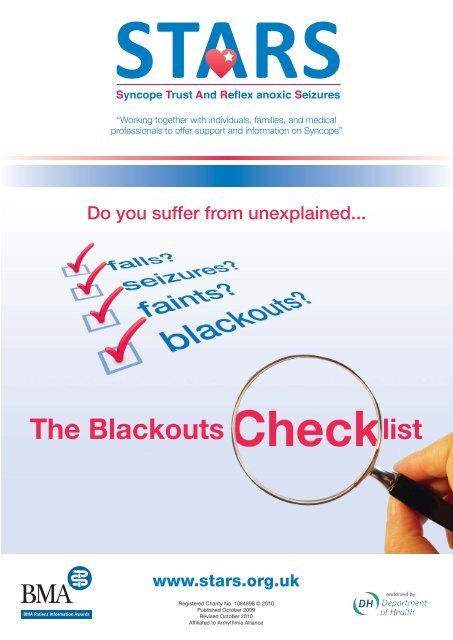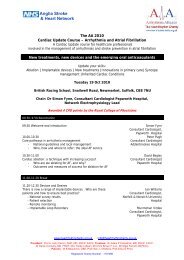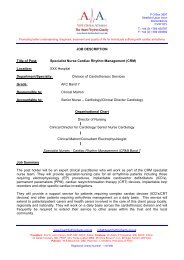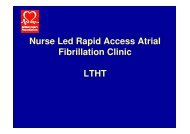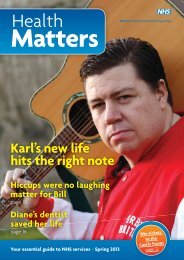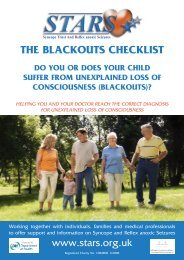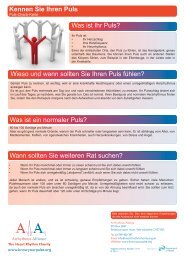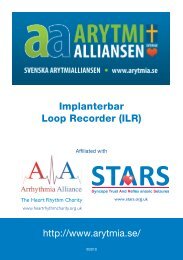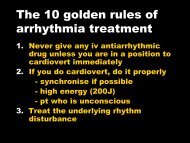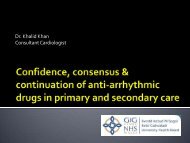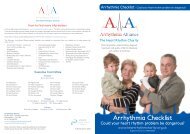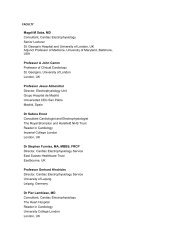The STARS Blackouts Checklist - Arrhythmia Alliance
The STARS Blackouts Checklist - Arrhythmia Alliance
The STARS Blackouts Checklist - Arrhythmia Alliance
Create successful ePaper yourself
Turn your PDF publications into a flip-book with our unique Google optimized e-Paper software.
“Working together with individuals, families, and medicalprofessionals to offer support and information on Syncope”Do you suffer from unexplained...<strong>The</strong> <strong>Blackouts</strong>listAffiliated to <strong>Arrhythmia</strong> <strong>Alliance</strong>BMA Patient Information Awardswww.stars-us.orgwww.stars.org.ukRegistered Charity No. 1084898 © 2010Non-profit Published organization October 2009 501(C)(3)Published Revised October February 2010 2010Affiliated to <strong>Arrhythmia</strong> <strong>Alliance</strong>endorsed by
<strong>The</strong> <strong>Blackouts</strong> <strong>Checklist</strong> was prepared under the guidance of <strong>STARS</strong>’ expert Medical AdvisoryCommittee. Its principal aim is to help you and your doctor reach the correct diagnosis for anyunexplained loss of consciousness (blackout).<strong>The</strong> <strong>Checklist</strong> gives you information and advice on the major reasons for experiencing a blackout, helps you prepare fora doctor’s appointment, and provides information on what to expect if you have to attend a hospital appointment.CHECKLIST: What do you need to know?✔✔✔✔✔A blackout is a temporary loss of consciousnessIf someone loses consciousness for a few seconds orminutes, they are often said to have had a blackout.Every patient presenting with an unexplainedblackout should be given a 12-lead ECG (heartrhythm check)It is important that the ECG is passed as normal.Most unexplained blackouts are caused by syncopeMany people, including doctors, assume that blackoutsare due to epileptic seizures, but much more commonlythey are due to syncope (pronounced sin-co-pee) –a type of blackout which is caused by a problem inthe regulation of blood pressure or sometimes with theheart. Up to 40% of the population will lose consciousnessat some point in their life due to syncope. Syncope canaffect all age groups but the causes vary with age, and inolder adults multiple causes often exist.Many syncopal attacks only require reassurance fromyour GPMany syncopal attacks require only explanation andreassurance from a GP or trained nurse regarding thelikely absence of anything being seriously wrong.Consultation with a specialist will be necessary, though,if the cause of the syncope remains uncertain or if thereare particularly concerning symptoms or there is a familyhistory of a heart condition.<strong>The</strong>re are three major reasons for why people mayexperience a blackout(s):– Syncope: a sudden lack of blood supply to thebrain. Syncope is caused by a problem in theregulation of blood pressure or by a problem withthe heart.✔✔– Epilepsy: an electrical ‘short-circuiting’in the brain. Epileptic attacks are usually called seizures.Diagnosis of epilepsy is made by a neurologist.– Psychogenic blackouts: resulting from stressor anxiety. Psychogenic blackouts occur most oftenin young adults. <strong>The</strong>y may be very diffi cult to diagnose.‘Psychogenic’ does not mean that people are ‘puttingit on’. However there is often underlying stress due toextreme pressure at school or work. In exceptionalcases it may be that some people have experienced illtreatment or abuse in childhood.Misdiagnosis is common but avoidable:– Many syncopal attacks are mistaken for epilepsy.– However epilepsy only affects slightly less than 1% ofthe population.– UK research has shown that approximately 30%of adults and up to 40% of children diagnosedwith epilepsy in the UK do not have the condition.– Many elements of a syncopal attack, such asrandom jerking of limbs, are similar to thoseexperienced during an epileptic seizure.– It can be diffi cult to tell the causes of the blackoutapart.Syncope causes falls:– Syncope causes a signifi cant number of falls in olderadults, particularly where the falls are sudden and notobviously the result of a trip or slip.– Many older adults will only recall a fall and will notrealise they have blacked out.– Greater awareness of syncope as a cause of fallsis key to effective treatment and prevention ofrecurring falls.
<strong>The</strong> <strong>Blackouts</strong>listLISTA CHECKLIST: DI CONTROLLO: Preparing for preparazione an appointment alla visita with your medicaGP GP✔✔✔Before visiting your doctor, it is important to write downwhat happens before, during and after a blackout or fall,including any symptoms you may experience.Try to take along a family member or friend who has seenyour blackout(s) or fall(s) to your appointment. If theycannot accompany you, ask them to write down exactlywhat they saw in the <strong>Checklist</strong> or ask them how thedoctor could contact them if necessary. If they canvideo an attack this is often very helpful.Family history; check with relatives whether there is anyfamily history of blackouts, faints, epilepsy, or sudden/unexplained deaths. This is important as it can oftenprovide a clue to the possible cause of your blackout.✔✔✔✔If there are any questions you want to ask your doctor orspecialist, make a note of them on the <strong>Checklist</strong> as it canbe easy to forget to ask them during the consultation.Check that both syncope and epilepsy have beenconsidered. Ask for referral to a syncope expert, ifpossible, or to both a cardiologist and a neurologist if youare not sure that the diagnosis is accurate. You could askabout possible referral to local rapid-access clinics forblackouts, falls or arrhythmias.Make detailed notes – use the space later in the<strong>Checklist</strong>.Take the <strong>Checklist</strong> and your notes with you to yourappointment.CHECKLIST: Questions to ask your GPDuring your GP appointment it can be hard to remember everything. Here are some suggestions of questions which you mayfi nd useful to ask during your appointment. <strong>The</strong>re is a section on the <strong>Checklist</strong> for you to make a note of any questions foryour GP.✔✔Can I still go to school or work whilst I am waiting to seethe specialist?Can I go to the gym/play sport whilst I am waiting to seethe specialist?✔✔What is the likelihood that a diagnostic test will deliver adefi nitive result?What will the treatment involve? Do you think I will haveto visit the hospital frequently or stay overnight?✔Can I still drive whilst I am waiting to see the specialist?✔Helping you and your doctor reach the correct diagnosisfollowing unexplained loss of consciousness or fallsHelping you and your doctor reach thecorrect diagnosis following unexplainedloss of consciousness or falls
<strong>The</strong> <strong>Blackouts</strong>listLISTA CHECKLIST: DI CONTROLLO: Preparing for preparazione specialist tests alla visita at at the medica hospital✔✔✔Following your appointment with the doctor you may bereferred for some tests with a specialist to discover thecause of your blackouts. Being prepared for these cansignifi cantly reduce the anxiety of a hospital visit. Try tolearn about these in advance at www.stars.org.uk<strong>The</strong> latest guidelines on the diagnosis of syncope statethat patients suspected of having syncope should receiveone of the following tests. Make sure that you receive theright test based on the nature of your symptoms.<strong>The</strong>re are information sheets on the following diagnostictests available from www.stars.org.ukEvery patient presenting with an unexplained blackoutshould be given a 12-lead ECG12-lead Electrocardiogram (ECG) for heart rhythmanalysis – Every patient presenting with an unexplainedblackout should be given a 12-leadElectrocardiogram (ECG). If there is uncertainty aboutdiagnosis the ECG should be reviewed by a heart rhythmspecialist (Electrophysiologist).Tests aimed at syncope:Lying and standing blood pressure recordingDrops in blood pressure with changes in posture cancause dizziness, falls and blackouts, particularly in olderpatients and those on blood pressure and water tablets.Tilt Table Testing – This procedure can be used toinduce a syncopal/fainting attack whilst connected toheart and blood pressure monitors.Heart Monitor – This is used to record heart rhythmswhilst away from the hospital or to activate during anepisode. A 24-hour/7 day heart rate monitor is veryunlikely to identify any problems if you experienceblackouts once a week or less, so do not be afraid to askabout other options.Implantable Loop Recorder (ILR) – This device shouldbe used to monitor heart rhythms for months at a timeif the episodes are less frequent than every 2 weeks. <strong>The</strong>device can remain in place for up to 3 years.Tests aimed at epileptic seizures:Electroencephalogram (EEG) – For brain activityanalysis to check for epilepsy. <strong>The</strong> EEG cannot be usedto diagnose epilepsy, but it is helpful to neurologists todecide which type of epilepsy is happening. <strong>The</strong> EEG ismuch less useful over the age of 35 years.MRI or CT-scan – <strong>The</strong>se are not aimed at showing thatsomeone has epilepsy, but are used to seek the causewhen epilepsy is likely.CHECKLIST: Questions to ask your specialistDuring your GP appointment it can be hard to remember everything. Here are some suggestions of questions which youmay fi nd useful to ask during your appointment. <strong>The</strong>re is a section on the <strong>Checklist</strong> for you to make a note of any questionsfor your GP.✔✔Can I continue to drive?What is the likelihood that a diagnostic test will delivera definitive result?✔If treatment is offered you may wish to ask whether itwill completely stop you having blackouts or falls. Ifno treatment is offered be sure to ask the best way tomanage your condition.❏ Dopo la visita medica, potrebbero esserle prescrittialcuni Further test Information: specialistici <strong>STARS</strong>, PO Box 175, per Stratford-upon-Avon, scoprire Warwickshire, le CV37 cause 8YDdelleperdite Tel: +44 (0)1789 di 450564 Fax: coscienza. +44 (0)1789 450682 Website: L’essere www.stars.org.uk preparati Email: info@stars.org.uk aiuta a
<strong>The</strong> <strong>Blackouts</strong>listPreparing your own own CHECKLISTSometimes during a consultation it can be hard to remember everything. <strong>The</strong> checklist is designed for you to complete.If you have a friend or family member who has been with you during a blackout or fall, it may be useful to ask for theirhelp in fi lling out parts of the form. This will help your GP to refer you to the appropriate specialist and the consultant towhom you are referred to make the right diagnosis.To give the doctors the best chance of making the right referral or diagnosis you should provide as many details as possibleabout your blackout(s) or fall(s).Name:1. List any medication(s) you are currently taking:2. Do you experience blackouts, falls or both? (Tick as appropriate)<strong>Blackouts</strong> Falls <strong>Blackouts</strong> and FallsIf you experience falls, are they unexplained or due to a slip or trip?UnexplainedSlip or trip3. Do you always lose consciousness? (Tick as appropriate)YesNoHow long are you unconscious for?4. How frequent are your blackouts or falls? (Tick as appropriate)Daily Weekly Every one to two weeksLess frequent than every 2 weeks5. Before a blackout or fall did you have any warning signs? (Tick as appropriate)Light-headedness Sweating NauseaLooking pale Palpitations Other (give details below)6. Is there anything that triggers your blackout or fall?(Tick as appropriate; if one trigger occurred at one time and another at another time, tick both)Pain or a fright Not eating AlcoholLack of sleep Stressful situation Flashing lightsAnxiety Going from sitting or lying to standing Standing for a long timeBeing very hot Exercise Other (give details below)Further Information: <strong>STARS</strong>, PO Box 175,Stratford-upon-Avon, Warwickshire, CV37 8YDTel: +44 (0)1789 450564 Fax: +44 (0)1789 450682Website: www.stars.org.uk Email: info@stars.org.ukBMA Patient Information AwardsEndorsed by© 2009 Published October 2009Revised October 2010
7. Describe what happens during your blackout or fallIf you are not conscious or cannot remember ask someone who was with you at the time to describe what happened.Your descriptionFriend or family descriptionDo your limbs move whilst you are unconscious? Do they jerk about randomly or rhythmically?*RandomlyRhythmicallyDo your arms move around your head?*YesNoDo you know whether your eyes are opened or closed?*Don’t know Open ClosedIf open, how do your eyes move?8. After your blackoutFollowing your blackout or fall how long before you regained consciousness?*After the blackout or fall are you confused on coming around? How long does the feeling last?How do you feel after a blackout or fall?Are your blackouts or falls affecting your daily activities or quality of life?YesNo* You will need to ask someone who was with you during your blackout9. Family HistoryIs there a history of loss of consciousness in your family?YesNoIf there is, who/what relation?Have there been any reported sudden deaths in your family under the age of 55 years? Is the cause known?Any other questions you would like to ask the doctor or specialist:


